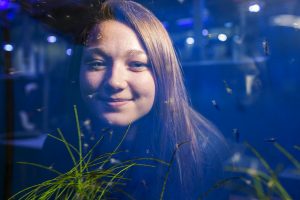Central Student Publishes Marine Bio Research

Senior Hanna Walker is a laboratory assistant at Central’s marine biology program whose research on the grass shrimp has recently been published.
The marine biology program at Central Campus is well-known in its field as an exemplary outlier at the high school level. Here’s the latest example of its depth, which it’s tempting to describe as oceanic:
Hanna Walker is a Laboratory Assistant for her instructor, Dr. Greg Barord. You know, like college professors have grad school lab assistants who do the grunt work for the research the profs publish?
Hanna’s been working diligently to raise tiny grass shrimp in the lab at Central.
“The grass shrimp are important because they allow our program to bring in new animals that require live food, such as cuttlefish and anglerfish,” said Dr. Barord. “What started out as one shrimp in a recycled 2-liter bottle has now turned into a streamlined operation that has the potential to raise 800 shrimp every 2-3 months. Among other things, the ability to raise these shrimp reduces our overall costs for live food that we can invest in other areas in the lab.”
Hanna’s a senior at Central and Roosevelt High School who, despite her precocity in marine biology, doesn’t necessarily have aquatic career ambitions. She’s thinking about veterinary science. If that happens it may lead her back into the water.
“I took marine bio last year and then worked all last summer as a lab manager,” she said. “Pretty soon the grass shrimp were all I had time for.”
It’s trickier than throwing a couple of grass shrimp together and letting nature take its course. For one thing, the species would eat a lot of its young if they weren’t rescued for later serving higher up the food chain. Hannah has learned to identify gravid females.
“You can see the egg sacs in their tails,” she pointed out to visitors.
So, one shrimp started leading to another, and another, and finally to Culture Methods of the Grass Shrimp, an academic paper that was published in the January, 2017 issue of Drum and Croaker, “A Highly Irregular Journal for the Public Aquarist,” with both Hanna and her teacher, Dr. Barord, listed as authors.
Almost immediately Hanna was contacted by a pro from the zoo in Denver, CO who saw the article and wanted to pick her brain about the breeding program she’s developed at Central.
“I certainly wasn’t expecting that,” she said.
Part of Hanna’s senior exit strategy is to train someone to replace her in the husbandry role, a process that’s already underway. One of the consequences of her success is that, the more shrimp that are bred, the more people they will require to keep up with them. Marine bio labs, like traditional Iowa livestock farms (including the small one on County Line Road operated by the Central Campus FFA chapter), involve lots of chores.
“It’s hard sometimes to hand things over to someone else who might not do things exactly the same way I do,” she said. “But I’m starting to get used to it.”
“Hanna will also be presenting this paper…at the DMPS Science Fair, the State Science Fair, and (fellow marine bio teacher) Kirk (Embree) and I will take her poster to the annual conference we attend each year to put up on display for other professionals,” said Barord. “Hanna’s work could have a huge impact on the aquarium industry.”
Not to mention her grade in high school marine bio!




